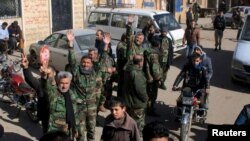The northward push by forces loyal to Syrian President Bashar al-Assad, with heavy backing from Russian air power, is frustrating U.S. officials while simultaneously deepening the divide between Washington and some of its would-be allies on the ground.
U.S. military officials caution that the regime advance has yet to substantially weaken the American-directed fight against the Islamic State terror group in Syria. But they worry it may be only a matter of time.
“We are concerned that forces that we're working with to focus on Daesh are focused on other things,” Operation Inherent Resolve spokesman Colonel Steve Warren told Pentagon reporters Wednesday, using the Arabic acronym for Islamic State.
Already, the U.S. has seen indications that moderate rebel groups are shifting resources from their fight with Islamic State along the so-called Mare’ line, which extends from the northern town of Mare’ to the Turkish border, to try to counter the regime advance.
“It bleeds combat power,” Warren said of the rebels’ response, describing the regime’s northward push as a “perceived threat.”
Syrian Kurds
Such comments have angered rebel commanders, who say the danger is not just from the south but also from Syrian Kurd YPG forces to the north, which until now have been a key U.S. ally in the fight against Islamic State.
Rebel groups accuse the Syrian Kurds of shifting tactics, lessening their focus on Islamic State to instead seize territory once held by various opposition groups. They accuse the Kurds of working in coordination with both the Assad regime and Russian air power.
“Russian airstrikes are helping the YPG on the ground. We see it every day,” said Zakaria Malahefji, the political officer of the 3,000-member Fastaqim Kama Umirt, a brigade aligned with the rebel alliance Jaish al-Mujahideen (Army of Holy Warriors).
U.S. officials deny such charges, reasoning the YPG offensive is actually helping by blocking regime efforts to move north and threaten moderate rebels battling Islamic State.
“I don't know if we've seen any evidence to indicate that the Afrin Kurds are working with the regime,” Warren said.
And while he admitted Syrian Kurdish forces have come under only “limited” pressure from the regime, he urged all U.S. allies to focus on the U.S.-led coalition's mission.
“We want them to stop fighting each other and start fighting Daesh,” Warren said.
Such words, however, may only serve to expand the growing rift between the U.S. and moderate Syrian rebel groups.
“The YPG is acting as a spoiler, tactically,” General Salem Idris, former chief of staff of the Free Syrian Army, told VOA last week in an exclusive interview. “They say they are not coordinating with the regime, but that is a lie.”
Opportunistic moves
Still, the feeling among many officials and analysts is that the Syrian Kurds are merely acting as opportunists.
“The Kurds are playing their own games to have their own state,” said Bassam Barabandi, a former Syrian diplomat who co-founded People Demand Change, an international development organization. “If they don’t get something from the U.S., they turn to Russia.”
Yet with the Syrian Kurds focused on shoring up some gains in the short term, possibly at the expense of moderate Syrian opposition forces, it could leave the U.S. without a reliable partner on the ground in Syria to counter Islamic State.
“More and more, the U.S. is disappointing regional allies and jeopardizing temporary alliances,” said Michael Pregent, a former U.S. intelligence officer who now is an adjunct fellow at the Hudson Institute. “It’s something the U.S. needs to look at.”
VOA’s Sharon Behn contributed to this report from Washington.





